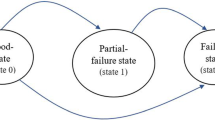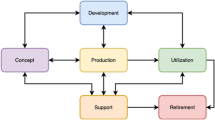Abstract
To improve reliability of real-time control systems, various fault-tolerance methods have been designed and implemented. We propose a highly reliable control system using modular and temporal redundancy, called dual-modular temporal redundancy (DMTR). Assuming that transient faults occur and recover with exponential probability distributions, we analyze the probabilistic schedulability of DMTR for multiple tasks with harmonic periods (DMTR-HP). After formulating a discrete-time reliability model for DMTR-HP, we formulate an efficient recursive computation algorithm for rapidly obtaining the probabilistic schedulability of the overall system. Considering the overhead for checkpointing in a DMTR-HP control system, we obtain the optimal number of subslots for maximum reliability using our DMTR-HP reliability model. In addition, we compare the reliabilities of DMTR-HP, DMTR using GCDP scheduling (DMTR-GCDP), and conventional dual-modular redundancy (DMR).
Similar content being viewed by others
References
Avizienis, A., and Kelly, J. P. 1984. Fault-tolerance by design diversity. IEEE Transactions on Computers 17: 67-80.
Bose, B., and Metzner, J. 1986. Coding Theory for Fault-Tolerant Systems. Englewood Cliffs, NJ: Prentice Hall.
Chung, K. J. 1995. Optimal test-times for intermittent faults. IEEE Transactions on Reliability 44: 645-647.
Crater, W. C., and Bouricius, W. G. 1971. A survey of fault-tolerant computer architecture and its evaluation. IEEE Transactions on Computer 4: 9-16.
Geist, R., Raynolds, R., and Westall, J. 1988. Selection of a checkpoint interval in time-critical environments. IEEE Transactions on Reliability 37: 395-400.
Ghosh, S., Melhem, R., Mosse, D., and Sarma, J. S. 1998. Fault-tolerant rate-monotonic scheduling. Real-Time Systems: The International Journal of Time-Critical Computing Systems 15: 149-181.
Hou, K. J., and Shin, K. G. 1996. Determination of an optimal retry time in multiple modular computing systems. IEEE Transactions on Computers 45: 374-379.
Kameyama, M., and Higuchi, T. 1980. Design of dependent failure-tolerant microprocessor system using triple modular redundancy. IEEE Transactions on Reliability C-29: 202-205.
Kim, B. K. 1999. Reliability analysis of real-time controllers with dual-modular temporal redundancy. In Proceedings RTCSA'99, Hong Kong, pp. 364-371.
Kim, H., and Shin, K. G. 1994. Modeling of externally-induced/common-cause faults in fault-tolerant systems. IEEE/AIAA Digital Avionics System Conference, pp. 402-407.
Kim, H., and Shin, K. G. 1996. Design and analysis of an optimal instruction retry policy for TMR controller computers. IEEE Transactions on Computers 45: 1217-1225.
Kim, H. White, A. L., and Shin, K. G. 1996. Susceptibility of controller computers to environmental disruptions and its effects on system stability. In IEEE Aerospace Applications Conference, pp. 309-320.
Koren, I., and Stephen, Y. H. S. 1979. Reliability analysis of N-modular redundancy systems with intermittent and permanent faults. IEEE Transactions on Computers 28: 514-520.
Krishna, C. M., and Shin, K. G. 1997. Real-Time Systems. McGraw-Hill.
Krishna, C. M., and Singh, A. D. 1993. Reliability of checkpointed real-time systems using time redundancy. IEEE Transactions on Reliability 42: 427-435.
Lin, T. H., and Shin, K. G. 1994. An optimal retry polity based on fault classification. IEEE Transactions on Computers 43: 1014-1025.
Lorczak, P. R., Caglayan, A. K., and Eckhardt, D. E. 1989. A theoretical investigation of generalized voters for redundant systems. In Proceedings of the Fault-Tolerant Computing Symposium, Los Alamitos, CA: IEEE, pp. 444-451.
Randel, B. 1975. System structure for software fault-tolerance. IEEE Transactions on Software Engineering SE-1: 220-232.
Saleh, A. M., and Patel, J. H. 1988. Transient fault analysis for retry techniques. IEEE Transactions on Reliability 37: 323-330.
Shin, K. G., and Kim, H. 1994. A time redundancy approach to TMR failures using fault-state likelihoods. IEEE Transactions on Computers 43: 1151-1162.
Shin, K. G., Lin, T. H., and Lee, Y. H. 1987. Optimal checkpointing of real-time tasks. IEEE Transactions on Computers 36: 1328-1341.
Ziv, A. 1995. Analysis and performance optimization of checkpointing schemes with task duplication. Ph.D. Dissertation, Stanford University.
Author information
Authors and Affiliations
Rights and permissions
About this article
Cite this article
Kim, J.K., Kim, B.K. Probabilistic Schedulability Analysis of Harmonic Multi-Task Systems with Dual-Modular Temporal Redundancy. Real-Time Systems 26, 199–222 (2004). https://doi.org/10.1023/B:TIME.0000016130.91111.75
Issue Date:
DOI: https://doi.org/10.1023/B:TIME.0000016130.91111.75




